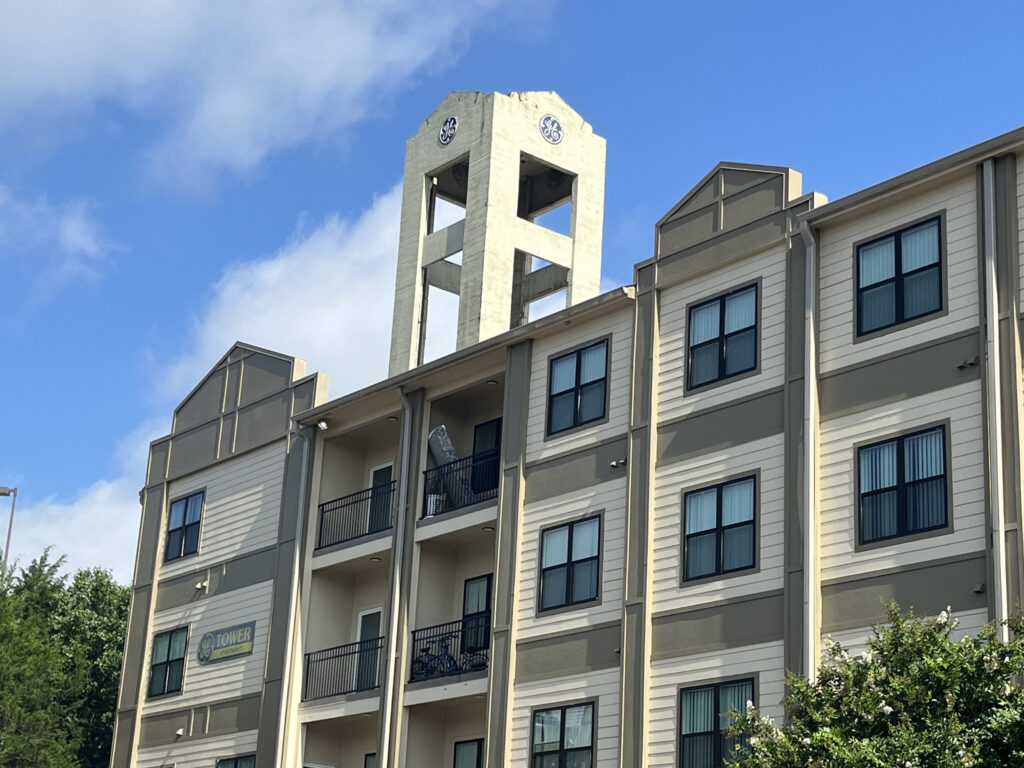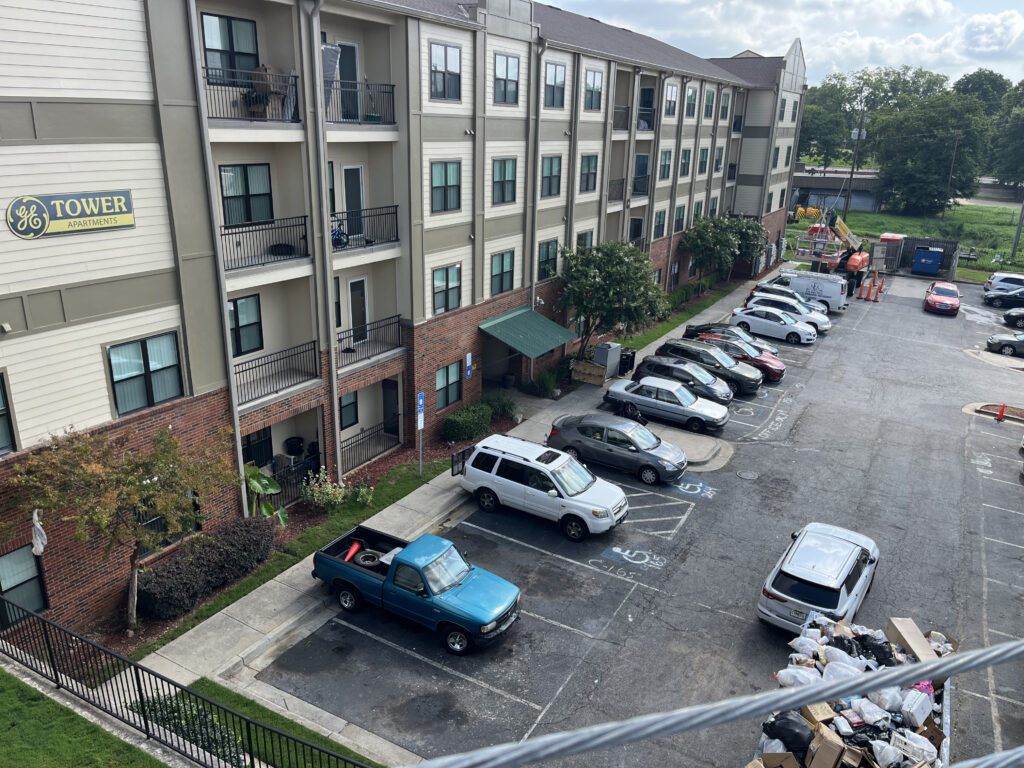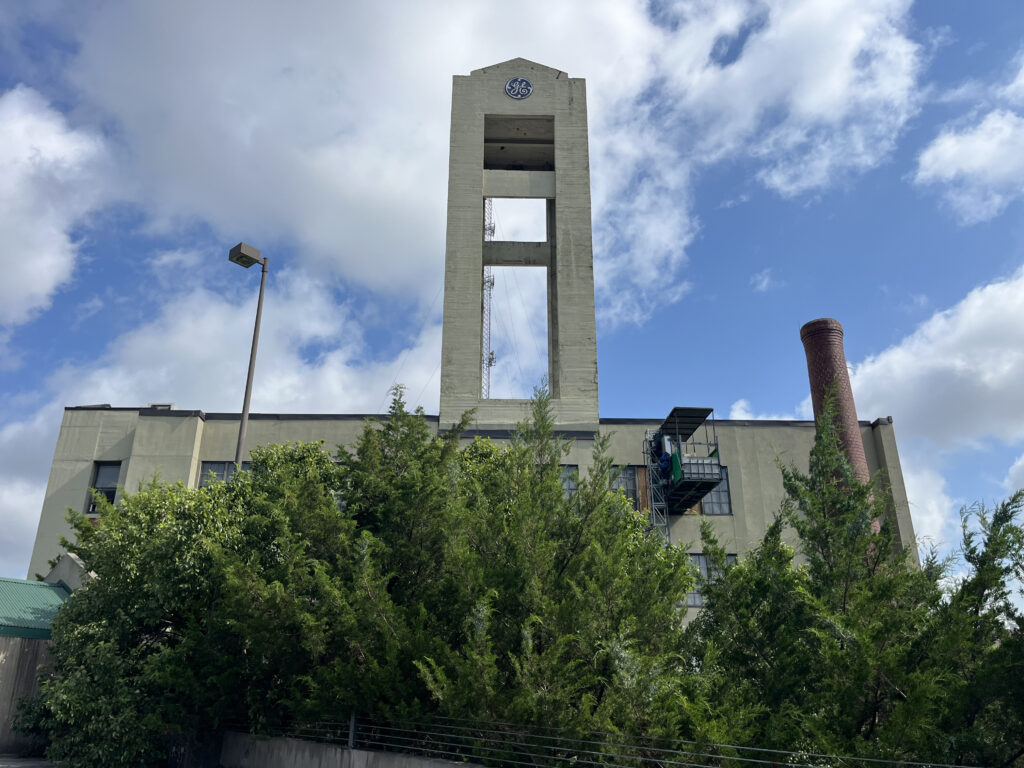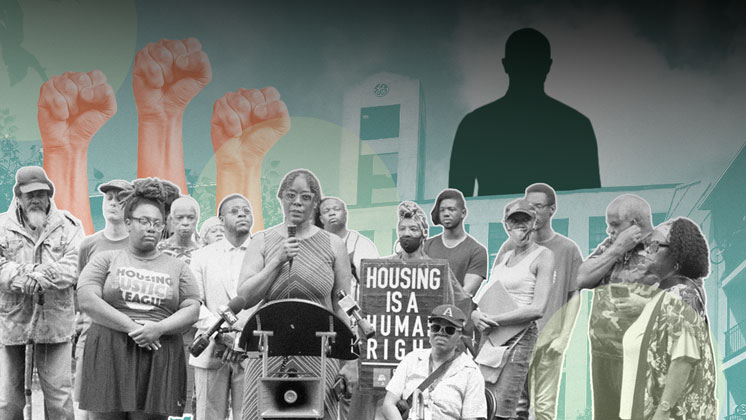Amid rising income inequality across the nation, housing crises in the South have been looming over residents for over a decade. Atlanta is one of the major hotbeds of this issue, and the city’s housing market is becoming less accessible to tenants as management companies ignore health and safety concerns and predatory financial practices. On July 25th, the residents of GE Tower, an apartment complex located in Atlanta’s West End community, held a press conference in front of the building, allowing tenants to shed light on unconducive practices by the complex’s management.
During the meeting, tenants used the platform to speak on unexplained charges on bills, structural issues, baseless eviction notices, and more.
Although GE Tower is not the only property where tenants are enduring these issues, a closer look at the complaints brought forth by residents reveals a textbook example of a landlord in Lincoln Avenue Capital who deprioritizes tenants while profiteering from their residence, which is also commonly known as a slumlord.
In Georgia, the term “slumlord” is not entirely anecdotal but rather a position of power that has affected thousands of residents across the state. In The Atlanta Journal Constitution’s “Dangerous Dwellings” series, an investigation was launched into the business practices of corporate landlords around the state. In their report, the AJC noted that Georgia’s tenant protections are almost nonexistent, as the state has allowed corporate entities to reap millions of dollars from rent profiteering without meeting the needs of tenants.

Tenants’ rights activists fought for and won protections through legislation, as recently as 2024, through HB404 and HB346—which aimed to prohibit retaliation against tenants for speaking out and taking direct action. However, landlords have continually leveraged their power against residents.
“When you start asking a lot of questions, you lose your popularity,” one resident said of the tenuous relationship between residents and the GE Tower administrative staff.
As corporate landlords seize more property every day, making housing units inaccessible, tenants are left to advocate for themselves and are often met with inaction from the companies. In 2023, for example, Excalibur Homes, a company that owns about 8000 properties around Atlanta, received an “F” rating from the Better Business Bureau, also known as BBB.
The complaint from BBB references hundreds of consumer complaints that Excalibur Homes delayed many necessary maintenance items and work orders while also withholding deposits without reason. The company responded, “Our ‘customers’ are the property owners, and they are very satisfied with our service. The BBB is getting complaints from tenants.”
This contradicts the fact that Excalibur specializes in property management, which includes handling money in the form of application fees, rent, and late charges.
“What’s going on right now, [when] you take your rent into the office, they will not give you a receipt, they will not stamp your money order,
Another group, Bell Partners, faces a class-action lawsuit after a fire torched the Bell Collier Village Apartments in July. Due to the building’s condition, all leases have been terminated, and residents say they want compensation for their losses. There are also Forest Cove apartments, where in 2022, tenants were forced to vacate the premises due to mold, rats, roaches, termites, snakes, rotted floors, and more.
This is similar to a notably dismal situation in Mississippi, where the tenants said the Sunset Village Apartments had gas leaks and other hazardous conditions. Throughout Atlanta and the South, there are examples of tenants speaking out in defense of themselves after neglectful management has maintained unhealthy and unsafe environments.
“It’s like you’ve never come in…”
GE Tower residents are not unlike the other examples, as they have provided plenty of examples through the hard work of persistent whistleblowing. Lincoln Avenue Capital received 30 million for renovations at GE Tower in 2021, but residents claimed that the Management company blamed tenants instead. Residents have most recently complained that they are being held responsible for water bills and rent charges that are inexplicably stacked with thousands of dollars worth of back payments.
Tenants have endured through a process of “wholesale” renovations, leaving residents responsible for footing the bill for relocation costs like additional housing and packing costs.
In a conversation with The Peach Pit, a long-time tenant, who wished to be identified as Ms. Hill, spoke about the extra bills, saying, “I’m paying one hundred and forty-two dollars a month for one [rent], and eight hundred and something dollars a month for the second [rent].”
She and other tenants say that despite paying for rent and water on time every month, the records of their payments have somehow been mismanaged. When elaborating on the details of overcharged tenants, Ms. Hill explained, “[The leasing office] said, ‘I can’t accept this check, and if you owe over $1,100, we can’t accept your check.’ I said, how is that, and she said, ‘You [in total] owe us $4,000.’”
According to Ms. Hill’s copies of documents shared with TPP, she was charged a “rental amount in error” of $4,240 in March of 2024.

There are also complaints from tenants who wish to remain anonymous about issues such as fire hazards, mold, pests, and other problems that would leave Lincoln Avenue Capital on the hook for a list of expensive fixes to keep GE Tower safe and up to code.
Lincoln Avenue Capital did not respond to a request for comment by the time of publishing.
Tenants’ Rights at the center of housing justice struggle
In support of communities like GE Tower, the local organization Housing Justice League is working to bring awareness to issues affecting Atlanta renters, homeowners, and the unhoused. The group focuses on eviction defense, housing policy, and more as it defends tenants’ rights. The space is a supportive platform that has empowered residents to share their personal experiences, bringing attention to the long-held call to action so that policies to protect tenants’ rights can gain more momentum.
“If you don’t keep [records], how [are] you gonna prove I gave it to them? So, therefore, they can take that and just say you didn’t pay your rent; that’s what’s going on.”
Several other communities are coming forward with their testimonies of what has been happening to the tenants in their areas, and with Atlanta’s housing security consistently decreasing, the movement is showing no signs of slowing down. The housing market in Atlanta has three landlords who own 11% of the market, which is only causing tenants to assess their surroundings and take matters into their own hands to meet their needs.
GE Tower residents shared documents with TPP, and they make clear the community has become accustomed to creating “ledgers” to keep records of their own payments and debts owed to the complex.
“What’s going on right now, [when] you take your rent into the office, they will not give you a receipt, they will not stamp your money order,” one resident says of the payment process.
It’s like you’ve never come in there. You can’t prove that you came in there if you don’t keep your receipt or your money order receipt. If you don’t keep [records], how [are] you gonna prove I gave it to them? So, therefore, they can take that and just say you didn’t pay your rent; that’s what’s going on.”
Documents and conversations reviewed by TPP reflect an environment where residents have grappled with constant turnover in the complex office. Residents say that they have met upwards of 15 office managers during their time as Tower residents. This, coupled with rocky changeovers between property managers, has left tenants without a consistent point of contact with anyone who may have answers to their living requests and needs.
This is especially true for tenants who need immediate accessibility because of age and disability.

Another tenant, who identifies as Ms. Anderson, spoke about the elevator, which, as of her conversation with The Peach Pit, had been down for two and a half years.
“I’m in the hotel right now because it’s [no longer working]. Originally, they said the elevator wouldn’t be fixed until all of the renovations were done,” Ms. Anderson said of GE Tower management’s intentions.
Repairing an elevator is not just about transportation or convenience, as it is a mandatory need for people like Ms. Anderson, who lives with cerebral palsy. It is a direct violation of American Disabilities Association(ADA) regulations for a residential building not to have an accessible elevator.
“The good thing is,” a spokesperson for HJL told TPP, “that the Atlanta Housing [Authority] has been willing, open, and transparent about how they’re willing to support tenants in the towers. But the next step for [tenants] is to make sure that that actually happens, and continue to meet with leaders over at Atlanta Housing to make sure the things that they said that they were going to do are actually being done.”
Suppose the scene of corporate ownership of homes continues to resemble the living conditions of Forest Cove Apartments and GE Tower. In that case, the power of tenants speaking up for themselves could catalyze tenant-centered changes to Atlanta residents’ housing security.

Kierra Johnson
Kierra is a multi-hyphenate from Atlanta, Georgia. Politicized by the Black Lives Matter Movement, they got their first experience organizing with Malcolm X Grassroots Movement. Kierra graduated from Clayton State University with a B.A. in English with a concentration in Writing. When they are not doing advocacy work, Kierra likes to write stories and poems, one of which was long-listed for the Fish Publishing Short Story Prize for 2021/2022. They also cohost a true crime podcast called I Ain’t a Killa with friends in Atlanta.

0 Comments